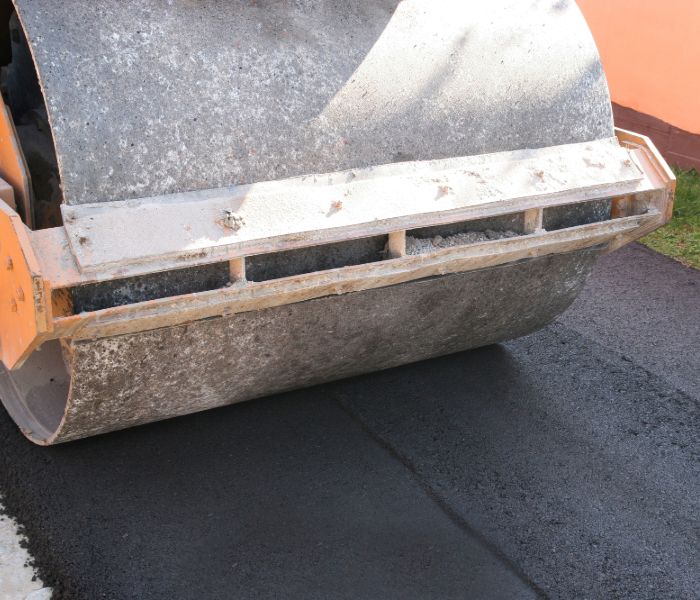How Long Does It Take To Pave A Driveway
If you're building a new habitation or planning renovations to an existing property, it'due south vital yous consider how long to allow a driveway to settle earlier paving. Installing new cobblestone or concrete over soil still in the process of settling can mean eventual heaving, shifting, nifty, and other serious pavement damage, along with costly repairs. A property owner might also consider how to prepare a driveway for paving and, in one case paved, how long before you should bulldoze on a new cobblestone driveway. Knowing all this important information tin can ensure your property has pavement that lasts and helps avoid otherwise unnecessary repair costs. In general, a driveway should settle for half-dozen months before paving. This recommended time span volition vary according to soil and weather weather, and proper compaction can permit you to pave far sooner. If you'll exist calculation new asphalt over electric current driveways, pavement is stamped and compacted as needed, to provide a solid base for new construction. The property is as well graded, to allow for proper h2o runoff or to ensure soil is non overly dry out and sandy. While a homeowner might not want to wait earlier paving, note that your property'south soil will settle over the months whether yous wait to pave or non! Every bit soil settles, it might and then allow ane section of concrete or cobblestone to sink, resulting in heaving, cracks, and potholes. Waiting for a driveway to settle and ensuring proper compaction ways far fewer repair bills over time, and a driveway in good condition and looking its best. A new driveway installation requires lots of prep work, to ensure the belongings can back up your fresh asphalt. A few simple steps in preparing a driveway for paving extends its lifespan and helps reduce otherwise unnecessary repairs. You should pave your driveway anytime from late leap to autumn, merely this schedule will patently differ according to local weather conditions. For example, a light drizzle might not interfere with pavement's limerick, but it's not recommended that you pave your driveway in the pouring rain, and especially during long-term storms that might leave standing h2o along the sub-base of operations or fresh pavement. Also, note that asphalt is heated earlier installation, to arrive pliable and easy to install and roll. A homeowner might then pave a driveway during very warm summer weather condition, to help continue asphalt warm and soft and more pliable. Your asphalt installation contractor can note if there are weather concerns in your area which means you should put off new driveway paving. Cobblestone sets and cures rapidly and so that you can typically drive on new asphalt within 24 hours. However, the longer you let asphalt fix and cure undisturbed, the less risk of harm, so look 48 hours earlier driving on it if possible. Note, too, that very warm weather keeps asphalt soft and pliable, as said. If yous've installed new cobblestone during hot summer conditions, information technology's best to expect several days before using your new driveway! Your cobblestone installation contractor might also annotation any reason to avoid driving on your new asphalt within one twenty-four hours, such as warmer weather or thin layers of blacktop. A calorie-free drizzle doesn't typically interfere with asphalt installation, as said. Nonetheless, go on in listen that asphalt is petroleum or oil-based, and of course, oil and water simply don't mix! Heavy rainfall causes the oil in asphalt to separate from its cement binders and amass, leading to weak fabric decumbent to chipping, corking, and potholes. In severe cases, pelting might cause crumbling potholes to form equally soon as the asphalt is installed, and might make the asphalt too runny to compact and so set properly. Rainfall also means standing water on the asphalt sub-base, so that the cloth doesn't have a solid foundation and won't set properly. If you live in an surface area prone to lots of rainfall, you might rely on an asphalt paving contractor for a new driveway installation rather than trying to tackle this project yourself. An asphalt paving company can evaluate weather conditions and know if your new driveway installation should be delayed due to rain, high humidity levels, and the like. At present that you know how long to permit a driveway to settle before paving and the steps needed to prepare a driveway for new asphalt, you lot might wonder how y'all protect that investment! Asphalt might final anywhere from 7 to xxx years, but the style yous maintain it affects its lifespan, either ensuring it lasts as long equally possible or causing undue stress and premature breakup. I vital tip for protecting fresh cobblestone is sealing it every bit often every bit needed; your cobblestone paving contractor tin can note how often you should schedule sealant for your new asphalt. Sealant provides an added layer of protection against weather, heavy rainfall, and other such damage. Motor oil and other automotive fluids likewise as corrosive chemicals such as fertilizer and snow salt as well harm asphalt binders, leading to chips, cracks, spalling, and potholes. To avert this impairment, take your dwelling's driveway pressure washed every twelvemonth or every bit oft equally needed to remove oil, fluids, and other materials. Note a few other quick tips for protecting fresh cobblestone: Concrete withal remains a favorite paving material for residential properties but there are many reasons why homeowners are choosing asphalt for driveways more than ever! One consideration is the lower installation price; asphalt costs $2.l to $4 per square foot, while concrete costs $4 to $half dozen per foursquare foot on average. For homeowners on a budget and especially for properties with longer driveways, asphalt is definitely a more affordable selection. Asphalt is also naturally porous and so that it absorbs sound, vibration, and impact. If y'all have children who play in the driveway, asphalt might mean less stress on their joints and a quieter surround! The dark color of cobblestone also provides lots of natural dissimilarity to your dwelling house'due south lawn, versus dull gray concrete. Homeowners specially might appreciate the fact that it's ofttimes easier to repair asphalt yourself than prepare physical, and especially if you need to tackle large cracks or potholes. Physical cracks and potholes might need fresh concrete mix which is often harder to apply yourself, whereas asphalt epoxy and other materials brand quick work of asphalt repair. An affordable fleck and seal too covers larger areas of asphalt harm, offer a fresh new wait for a fraction of the cost of concrete repaving. Can you put new asphalt over an existing driveway? Depending on its thickness, you can typically put new asphalt over an existing driveway; however, damaged pavement provides a poor foundation for asphalt and should be removed instead despite its added cost. Should you water a new asphalt driveway? No thing how long you allow a driveway to settle before paving, you should h2o a new asphalt driveway if outside temperatures achieve 80 degrees. Watering the driveway volition keep asphalt cool so it doesn't separate. This information was brought to y'all by the team at Plano Asphalt Paving. If you're in the Plano area and have questions about how long to allow a driveway to settle before paving and if asphalt if the best option for your property, telephone call the best of Texas paving companies! Nosotros offer total-scale asphalt installation and repairs, using only the highest-grade materials with an industry-leading warranty you can trust. Whatever your needs for new asphalt installation, chip and seal, asphalt sealing, or driveway paving in Texas, call us at Plano Cobblestone Paving today! 
How Long Should a Driveway Settle Before Paving?
How Do You Ready a Driveway for Paving?

When Should Yous Pave Your Driveway?
How Long Earlier You Should Drive on a New Asphalt Driveway?

Does Rain Hurt a New Driveway?
How Do Y'all Protect Fresh Asphalt?

Which is Better for Driveways, Asphalt, or Concrete?
Related Questions:
Source: https://planoasphaltpaving.com/blog/how-long-to-allow-driveway-to-settle-before-paving/

0 Response to "How Long Does It Take To Pave A Driveway"
Post a Comment